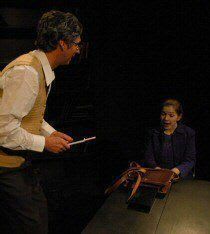It's very odd: I don't remember a production of Ionesco's The Lesson for at least a decade (and probably more) and yet there have been two within a couple of months, this one by the Icarus Collective and one by Not Applicable at London's White Bear (which Lennie Varvarides reviewed).
The Lesson (1951) is Ionesco's second play, following The Bald Prima Donna, and he described it as an "anti-play". It's short - this production runs for just 65 minutes -and, like its better known predecessor, takes language and meaning as its starting point.
The characters are a hopelessly naïve schoolgirl (Amy Loughton), a mild mannered but increasingly demented professor (John Eastman) and a maid (Julia Munrow) who strives unsuccessfully to keep the professor under control and who cleans up after him. But this is Theatre of the Absurd and they are not characters in the conventional theatrical sense but rather abstractions, representations of the bourgeois world which Ionesco despised, and their inability to communicate and the increasing futility, anger and, eventually, violence which this provokes is the real subject of the play.
Building on the essential meaningless of language which we find in The Bald Prima Donna, where the dialogue is based around the unconnected sentences of an English-French phrasebook, the lesson which the professor is giving to the schoolgirl begins with the supposedly universal language of Mathematics and then moves on to the study of language itself, Philology. The professor's efforts to get the pupil to understand become more and more frantic and he begins to bully and force comprehension on her by his increasingly dominating attitude, her incomprehension becomes more dense and she develops a toothache as a defence mechanism, and the fears of the maid are played out in front of us - for, she tells us, the fortieth time that day.
The play has been interpreted as a response to the Nazi régime in France, where Ionesco lived during World War II, and Icarus tells us that they have "twisted" the text to make it an examination of the state of England today. In some ways no twisting is required, for the alienation which results from the inability to communicate lies at the centre of the play, but to suggest that The Lesson is a play about bullying, whether on a personal or international scale, actually diminishes it. But to be honest, it is Ionesco who shines through this production, not the directorial gloss.
The performances are superb: Eastman grows from an almost nervous, mild mannered pedagogue to a raging tyrant with an astonishing smoothness and Loughton's increasing bewilderment and desperate attempts to hold her own against the growing storm evoke real sympathy in the minds of an audience which, at first, were inclined to dismiss her as a silly little girl. And Munrow's increasing desperation to control her boss, followed, on her failure, by the matter of fact covering up and the suggestion that it is all about to start again, are chilling.
Chris Hone's set, in which everything - including the stage floor - turns into a blackboard, is cleverly conceived and carried out..
The production tours to Monmouth, Trowbridge, Hastings, Guildford, Slough, Bracknell and London's Kenneth More Theatre
